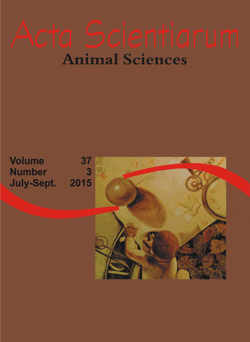<b><i>In vitro</i> degradation and gas production of glycerin generated in the biodiesel production chain
Resumo
This study was realized to evaluate the production of gas and volatile fatty acids when glycerin was used to replace four forage species through the use of a semi-automated technique in vitro. The experimental design included 4 treatments and 4 replications. The treatments consisted of increasing levels of glycerin (0, 30, 50 and 70%), which was used to replace the forage plants Elephant grass, sugar cane silage, corn silage and Brachiaria grass. Replacement of the Brachiaria and Elephant grasses with glycerin linearly reduced the production of methane and carbon dioxide and ammonia nitrogen and had a positive effect on forage quality (p < 0.05). With the addition of glycerin, the values for acetate concentration decreased (p < 0.05); however, when added glycerin there was increased in propionic and butyric acid concentration (p < 0.05). Substitution of forage species for glycerin by tests for semi-automatic technique in vitro reduce the production of greenhouse gases (CH4 and CO2) which reduction in energy loss, and increase volatile fatty acids propionic and butyric.
Downloads
DECLARAÇÃO DE ORIGINALIDADE E DIREITOS AUTORAIS
Declaro que o presente artigo é original, não tendo sido submetido à publicação em qualquer outro periódico nacional ou internacional, quer seja em parte ou em sua totalidade.
Os direitos autorais pertencem exclusivamente aos autores. Os direitos de licenciamento utilizados pelo periódico é a licença Creative Commons Attribution 4.0 (CC BY 4.0): são permitidos o compartilhamento (cópia e distribuição do material em qualqer meio ou formato) e adaptação (remix, transformação e criação de material a partir do conteúdo assim licenciado para quaisquer fins, inclusive comerciais.
Recomenda-se a leitura desse link para maiores informações sobre o tema: fornecimento de créditos e referências de forma correta, entre outros detalhes cruciais para uso adequado do material licenciado.








































